Studying History of Art at Cambridge
- UCAS Code: V350
- Minimum offer: A*AA
- Essential subjects: No specific subjects are essential to apply to History of Art, but A* at A-level/7 at IB-level in an essay-based subject/language is required.
- Useful subjects for a strong application: History, History of Art, English (language or literature), Languages (ancient or modern)
The Department of History of Art at the University of Cambridge is a world-renowned centre for the study of art history from the Middle Ages to the twenty-first century in Europe and beyond. It is a leading centre for object-led research into art and architecture, broadly defined (including visual and material culture). The department works closely with significant collections in Cambridge including the Fitzwilliam Museum and Kettle’s Yard. You will be taught by academics who are active researchers. They publish books and scholarly articles and write and speak regularly for the wider public and media.
The History of Art course (tripos) is a three-year degree programme, focusing on direct engagement with, and analysis of, works of art and architecture.
What can I do with a degree in History of Art?
Studying History of Art furnishes you with a wide range of skills which are highly sought after by employers in a wide range of professions. Many graduates of History of Art go on to further study, completing Masters’ and PhDs in related fields. Students also frequently gain employment in fields related to their degrees, such as heritage and conservation, working in museums, galleries, curation, the fashion industry, film and television, and the built environment. Others use the transferable skills gained during their degrees to pursue successful careers as lawyers, bankers, actors, writers, doctors, accountants, politicians, and in business, as well as in many other walks of life.
For more information, please visit the University Careers Service website.

Studying History of Art at St Edmund’s College
Every year St Edmund’s is home to a small but close-knit group of undergraduate students on the History of Art degree programme. We are also home to postgraduates studying for MPhils and PhDs in History of Art and related subjects. As mature students, those studying History of Art at St Edmund’s are welcome to attend a very wide range of seminars organised by the College, the Department and the University. They have the advantage of being geographically close to Kettle’s Yard, an institution of the University of Cambridge and a source of inspiration and first-hand interaction with works of art, and to the University Library as well as the Fitzwilliam Museum’s reference library. Seminars often take place on-site in Cambridge’s museums and galleries.
You are taught in a mix of college-based small group supervisions and Faculty lectures and classes.
The college offers several spaces where you can study and work on your essays including the Paul Luzio Library building, the Norfolk Library, study desks in the Mount Pleasant Halls Common room, the comfortable couches of the CR, in Edspresso, our café, or the benches in our lovely apple orchards!
We also have six study rooms (2 in the Luzio Building, 2 in Norfolk Building, and 1 in Mount Pleasant Halls), where college supervisions typically take place, and which can also be booked by students for their private study time or group projects.
Our college also has an extremely supportive Welfare and Wellbeing Department, which is happy to lend an ear and provide support should a student feel anxious or overwhelmed with the academic year.
How to Apply
Applications for all courses are made through UCAS. You must apply by 15 October 2025 to be considered for entry in October 2026.
Requirements
Written Work
Admissions Assessment
Interviews
Deferred entry
Affiliated Students
What is a typical Term’s work
Weekly one-hour supervisions taught in Colleges are the focal point of the academic week, providing personal supervision and the opportunity to debate with and learn from senior art historians. They are usually taught one-on-one or in small groups. You will write essays or prepare other materials for these sessions, in which you will receive constructive feedback on your work and further guidance.
Alongside preparing for your weekly supervision, which remains the centrepiece of the Cambridge experience, you will attend a number of lectures each week. These are designed to give you clear introductions to objects, art and architecture across time and space. Parts of the course are also taught through seminars where group discussion, small group work and presentations are encouraged.
People
- Dr Anna Gannon, Director of Studies


